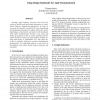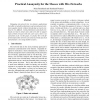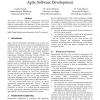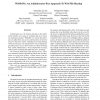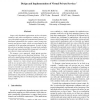109
click to vote
WETICE
2003
IEEE
15 years 8 months ago
2003
IEEE
The ability of worms to spread at rates that effectively preclude human-directed reaction has elevated them to a first-class security threat to distributed systems. We present th...
95
Voted
WETICE
2003
IEEE
15 years 8 months ago
2003
IEEE
Recently, Agile Software Processes have been discussed as flexible and light-weight alternatives to established Software Engineering approaches, in order to overcome the obstacles...
103
click to vote
WETICE
2003
IEEE
15 years 8 months ago
2003
IEEE
Designing mix-networks for low-latency applications that offer acceptable performance and provide good resistance against attacks without introducing too much overhead is very dif...
110
Voted
WETICE
2003
IEEE
15 years 8 months ago
2003
IEEE
This article compares traditional requirements engineering approaches and agile software development. Our paper analyzes commonalities and differences of both approaches and deter...
123
Voted
WETICE
2003
IEEE
15 years 8 months ago
2003
IEEE
The types of awareness relevant to collaborative software engineering are identified and an additional type, “historical awareness” is proposed. This new type of awareness is...
119
Voted
WETICE
2003
IEEE
15 years 8 months ago
2003
IEEE
Suitable programming models and associated supporting infrastructures are required to deal with large software systems dived in complex and dynamic network environments. Here, wit...
106
Voted
WETICE
2003
IEEE
15 years 8 months ago
2003
IEEE
Collaboration over the Internet depends on the ability of the members of a group to exchange data in a secure yet unobtrusive manner. WebDAVA is a system that allows users to de�...
100
Voted
WETICE
2003
IEEE
15 years 8 months ago
2003
IEEE
This paper presented an approach for the evaluation of a collaborative system, after the completion of system development and software testing but before its deployment. Scenario ...
112
Voted
WETICE
2003
IEEE
15 years 8 months ago
2003
IEEE
Agent.Hospital is an open agent-based (software) framework for distributed applications in the healthcare domain. Previous appropriation of the Agent.Hospital development is appli...
147
Voted
WETICE
2003
IEEE
15 years 8 months ago
2003
IEEE
Large scale distributed applications such as electronic commerce and online marketplaces combine network access with multiple storage and computational elements. The distributed r...

